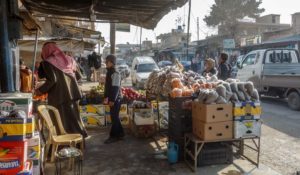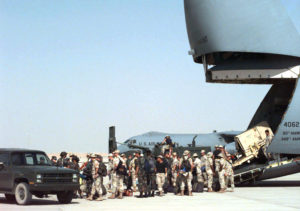ISTANBUL- Two blasts rocked Istanbul on Thursday, killing at least 25 people and devastating both the HSBC Bank headquarters and British consulate in an apparent suicide attack Turkey called a strike against British interests. Turkish television, quoting city health officials, said that besides the 25 killed, 390 people were injured. A caller to Turkey’s semi-official Anatolian news agency claimed responsibility in the name of Osama bin Laden’s al Qaeda group, which Washington blames for September 11 U.S. attacks. British Foreign Secretary Jack Straw, whose country is the United States’s chief backer in the Iraqi occupation, said the strikes bore “all the hallmarks of the international terrorism operations practiced by al Qaeda and associated organizations.” The blasts, coinciding with a British visit by President Bush, were the second such strike in Muslim Turkey in five days. Turkey’s interior minister said he saw a connection with weekend attacks on two Istanbul synagogues that killed 25. Men and women wept on the streets, their clothes blood-stained, nursing their wounds. Bodies lay amid a chaos of wreckage outside the towering Istanbul headquarters of London-based HSBC, the world’s second largest bank by market value. Witness accounts suggested the blasts were suicide bombings. “There is one dead on the lower floor and two dead on the upper floors,” an emergency worker who was inside the HSBC building said. “But there were many more who died on the street and in cars. I believe as many as 10 people died outside.” Firefighters were working to put out a fire inside the 12-storey building, charred and black from the explosion. Twisted pieces of cars and broken glass lay across the street outside the building. “The windows just exploded, everything exploded,” said one banker who worked in the HSBC building. Turkish Foreign Minister Abdullah Gul said Turkey would not bow to terror. “We will continue our fight against terrorism,” he told reporters in Stockholm. “This time it was British, last week it was two synagogues.”
CNN-Turk television said many were badly wounded in the blast at the British consulate. Straw said three or four people were unaccounted for in the building.
Hakan Kozan, 29, said he saw a white truck speeding toward the site of the consulate blast around 10 seconds before the explosion. “There was a great blast, massive blast,” Kozan said. VAN SEEN Witness Mehmet Celik told CNN Turk he saw a brown Skoda van with an open back driving toward the British consulate seconds before the blast rocked the building. He was standing about 10 meters (yards) from the site. CNN showed bodies covered in blood being carried away. On Saturday, two trucks packed with homemade explosives detonated outside the Beit Israel and Neve Shalom synagogues in Istanbul, killing 25 people and wounding hundreds more. A unit of al Qaeda claimed responsibility for the Saturday attacks and warned that the Islamist network was planning more attacks against the United States and its allies. The White House said it was monitoring the situation closely in Istanbul, Turkey’s commercial capital and a city of some 12 million people divided by the Bosphorus Strait into European and Asian sectors. Turkey is one of Washington’s closest political and military allies in the Muslim world — a relationship that singles it out as a possible target for Islamist militants. Its government has Islamist roots but its policies are strongly pro-Western. Washington has long promoted Turkey as a model Islamic democracy that could be emulated by other Muslim countries. There was no explicit link between Bush’s visit to Britain and the blasts on Thursday and Saturday. But intelligence officials have long feared militants could launch attacks on “soft targets” in countries such as Turkey. The attacks could deal a tremendous blow to a Turkish economy only now struggling from recession and facing still huge debt repayments over the next year. A tenuous return of foreign investment could be put at risk by any continued atmosphere of danger. The Istanbul stock exchange was closed after the explosions, but not before the stock index had dived 7.37 percent amid panic sales. Banks ceased quotes on the Turkish interbank foreign exchange market.






